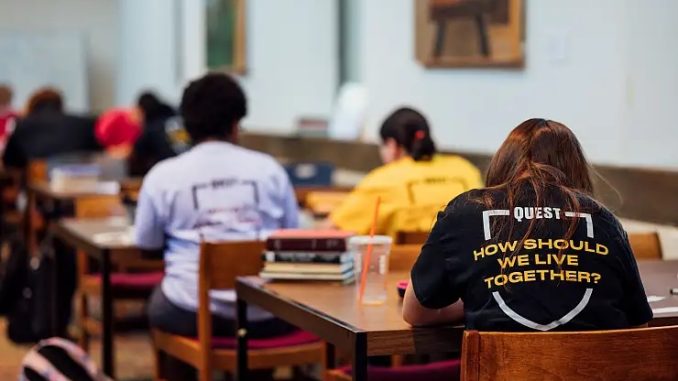
Embarking on their Ursinus College journey, first-year students are called upon to engage with and to thoughtfully examine the central questions of a liberal education: What should matter to me? How should we live together? How can we understand the world? What will I do? The Common Intellectual Experience is a two-semester course that brings together groups of 16 first year students from all interests and disciplines. Even as students complete CIE courses and transition into their next years of college, CIE continues to be a unifying experience for all Ursinus students.
While the general experience of CIE fosters connections between students, the CIE Syllabi undergo changes and are adapted at decided yearly intervals. The most recent CIE Syllabus Change process, which has been ongoing for the past year and a half, is still underway, with two syllabus change options awaiting feedback before an official vote on the adoption of the CIE Syllabi for Fall 2025 – Spring 2027. Both syllabus change options incorporate new texts from the text proposals and both of them have the plan for Common Events included. The major difference between the options is that Option 2 cuts more texts and incorporates workshops as a part of the syllabi in both Fall and Spring. The proposals of these syllabi options are still being discussed and feedback from participants in the CIE Syllabus Change process is still being taken into consideration. Diane Skorina, Librarian of the College and Chair of the Common Intellectual Experience, will formally present final versions of these syllabi options and will explain the voting process to the faculty at the February 19th Faculty meeting, and they will hold the vote via a Qualtrics form shortly thereafter.
“It is important to note that the CIE Syllabus Committee only considers what is proposed from the campus community. In this cycle, we got proposals from students, faculty, staff and even alums,” said Skorina. The members of the committee read the proposals and the texts proposed and use a variety of criteria to determine what might be good additions to the CIE syllabi, “one of the most important of them being what we think will be challenging but ultimately interesting and, hopefully, mind-expanding to first-year students,” explains Skorina.
Similar to a CIE class, the members of the Syllabus Change Committee engage in a lot of discussion. They take into account the benefits of new texts and topics for students, while also ensuring that they do not change too much of the current syllabus to prevent more difficulty for faculty members to teach and to preserve some of the commonality from year-to-year.
Although the members of the Syllabus Change Committee work to preserve some of the commonality, the proposed syllabi options do demonstrate some new approaches. In both proposed options, the only film was cut from the syllabus. The Committee considered a couple of replacement films, but did not add them to the syllabus as other texts that were proposed seemed to fit into the syllabus better.
“CIE really is a class that is asking students to become closer and better readers and writers, because reading written texts is absolutely integral to learning in any discipline and to a great variety of careers; the written word is central to a liberal arts education and will remain important in students’ personal and professional lives. So, it is a class that still is heavily tilted towards written texts for this reason,” says Skorina.
However, the possibility of a film screening as one of the common events is still being discussed. The Syllabus Change Committee’s thinking is that a common event in the Fall or Spring could include a faculty member introducing a film and having the students watch it together collectively. Students would then have breakout sessions to discuss the film. The Committee thinks “this would be a better way to approach films in CIE, and give us a flexibility to choose films that will resonate with the students,” says Skorina.
In addition, the proposed syllabi still include artwork and music, with an added multimedia Voyager piece proposed by a Physics professor.
“In my opinion, the best texts (broadly defined as readings, films, music, art…) are ones that cause students to examine their own beliefs. The texts should foster discussion of the four core questions, and in particular have students consider what matters to them and how we should live together. A good text has the student consider the point of view that text offers and to compare it with their own to see how it either deepens their understanding of their own thoughts or has them better understand different perspectives,” says Dr. Rebecca Lyczak, Professor of Biology. “In my opinion, a great CIE text can be reexamined many times and new things can be uncovered. A good text should result in a lively conversation in which students can question, debate, and better understand themselves and others.”
CIE creates intellectual communities that transcend majors and specific disciplines, creating an impact that spreads far beyond two semesters. Skorina’s deepest hope is that “the class generates interest in the near-infinite possibilities of thought, and gets students to take classes outside of their intended majors so that they can think broadly and deeply and widely and, perhaps most importantly, critically.”
